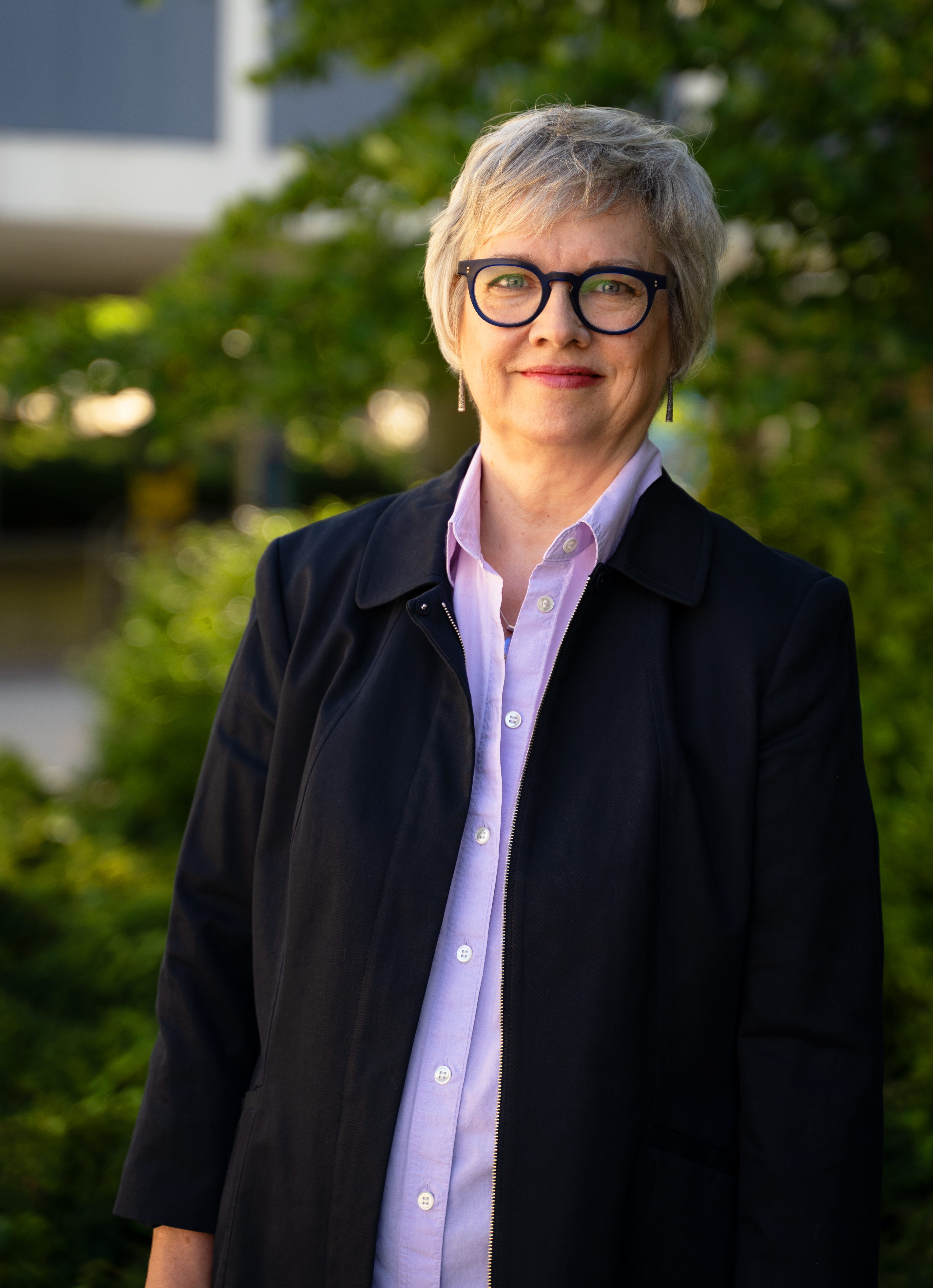Elizabeth Hodgson
Thematic Research Area
Period/Nation Research Area
Education
BA Hons, University of British ColumbiaMA, University of Toronto
PhD, Brandeis University
About
I earned my BA (English Honours) at UBC (1985), my MA at University of Toronto (1987), and my PhD at Brandeis University in Boston (1992). I returned to UBC in 1995 as a faculty member.
The English Renaissance is my scholarly neighbourhood, and I’m particularly interested in historicism, feminist theory, poetics, and cultural theory. I’ve published Gender and the Sacred Self in John Donne (1999), Grief and Women Writers in the English Renaissance (2015), and The Masculinities of John Milton (2022) along with articles and book chapters on Milton, Shakespeare, Lanyer, Philips, funeral sermons, epistolary collections, psalm translations, and conduct books.
I have been TA Coordinator in our department and am the instigator and faculty advisor for our new PhD Co-op program; I’ve also been Associate Head (undergraduate) and Chair of the Honours program. I’ve been president of the UBC Faculty Association, the union representing faculty and librarians at UBC, and I am currently Chief Negotiator for our collective bargaining team. I have served on the Academic Freedom & Tenure Committee of CAUT (our national professors’ organization).
Teaching
Research
My work examines gender in the cultural histories of early-modern English literature, mostly poetry and prose works. My most recent monograph, The Masculinities of John Milton, Cultures and Constructs of Manhood in the Major Works (Cambridge, 2022) is the first published monograph on Milton’s men. Examining how Milton’s fantasies of manly authority are framed in his major works, this study exposes the gaps between Milton’s pleas for liberty and his assumptions that White men like himself should rule his culture. From schoolboys teaching each other how to traffic in young women in the Ludlow Masque, to his treatises on divorce that make the wife-less husband the best possible citizen, and to the later epics, in which Milton wrestles with male small talk and the ladders of masculine social power, his verse and prose draw from and amplify his culture’s claims about manliness in education, warfare, friendship, citizenship, and conversation. This revolutionary poet’s most famous writings reveal how ambivalently manhood is constructed to serve itself in early modern England.
I am also working on a study provisionally entitled Beautiful Misogyny: Aesthetics and Masculinism in Renaissance Sonnets and 21st century Songwriting.
Publications
Selected Publications
- The Masculinities of John Milton. Cambridge University Press, 2022.
- Grief and Women Writers in the English Renaissance. Cambridge University Press, 2015.
- Gender and the Sacred Self in John Donne. University of Delaware Press, 1999.
- “Defensor Feminae: Aemelia Lanyer and Rachel Speght”, in World-making Women: New Perspectives on the Centrality of Women in Early Modern English Literature and Culture, Pamela S. Hammons and Brandie R. Siegfried, Editors. Cambridge University Press, 2021.
- “Mind Your Manors: The Hundred-Mile Host in English Renaissance Literary Cultures,” Early Modern Hospitality, ed. David Goldstein & Marco Piana. University of Toronto, 2021.
- “Milton, Marvell, and the Amorous Theology of Vegetables,” Milton Studies 63.2 (2021).
- “’Sacrificing Parts in Two Gentlemen of Verona” Shakespeare 15.1, 2019. 21-31.
- “Playing Judge: The End-Games of King Lear,” Shakespeare Jahrbuch 2018. 2-17.
- “Failed Alliances and Miserable Marriages in Katherine Philips’ Letters,” The Politics of Female Alliance in Early Modern English Literature, Eds., Niamh J. O’Leary & Christina Luckyj. University of Nebraska Press, 2017. Winner of the Society for the Study of Early Modern Women’s prize for best collaborative project (2017).
- “Remembering Cleopatra,” Shakespeare and Consciousness. Eds Paul Budra & Clifford Werier. Palgrave, 2017.
- “Queen David: The Politics of 16th century French and English Vernacular Psalms,” Vernacular Bibles and Religious Reforms. Eds. Wim François & August den Hollander. Peeters Publishers (Leuven), 2016.
- “Katherine Philips at the Wedding,”The Noble Flame of Katherine Philips: A Poetics of Culture, Politics, and Friendship. Ed. David L. Orvis & Ryan Paul. Duquesne University Press, 2015.
- “’A Paradaisal Creature: Eve and the Unsuspecting Garden in Seventeenth Century Literature,” Biblical Women in Seventeenth Century Literary Culture. Ed. Victoria Brownlee & Laura Gallagher. Manchester University Press, 2014. 41-58.
- “Milton Takes the Veil,”Milton and Questions of History. Ed. Mary Nyquist & Feisal Mohamed. University of Toronto Press, 2012.
- “Alma Mater,” Performing Pedagogy: Gender and Instruction in Early Modern England. Eds. Kathryn Moncrief & Katherine Montgomery. Ashgate, 2011.
- ““A cypress, not a bosom, hides my heart”: Olivia’s Veiled Conversions,” with Amy Smith. Early Modern Literary Studies 15.1: 2011, np.
- “A Fine and Private Place: Vives, Taylor, and Chapman’s Theatrical Widow”, Medieval & Renaissance Drama in England 22: 2009.
- “The Domestic ‘Fruit of Eves Transgression’ in Stuart Funeral Sermons,” Prose Studies 29:1, April 2006.
- “Mourning, Gender, and Prophetic Authority in Paradise Lost,” Early Modern Literary Studies 11.1, May 2005.
- “Prophecy and Gendered Mourning in Lanyer’s Salve Deus Rex Judaeorum,” Studies in English Literature 43:1, Winter 2003.
- “When God Proposes: Agency, Marriage and Gender in Milton’s Tetrachordon,” Milton Studies 31, 1994.
Additional Description
I am deeply fascinated by social history, gender in all of its forms, and spiritual cultures as well as cultural politics writ large; all of my courses reflect these priorities.
I teach, mentor, and supervise interactively and collaboratively. I have worked with students on research projects covering Cavendish and intellectual history; Shakespeare and Calvinism; Herbert’s “The Temple” and Kierkegaard; allegory and spatial theory; Donne’s holy sonnets and queerness; Milton’s Satanic colonialism; war in Henry V; Erasmus, Spenser, and grammar; early modern women writers and poetic blackness… that sort of thing.
